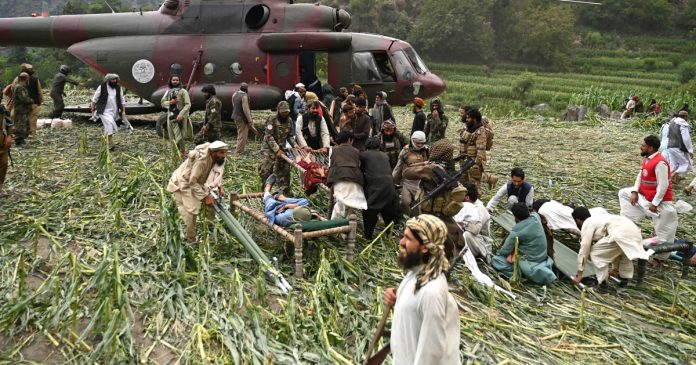The 6.0-magnitude temblor struck a remote mountainous area in eastern Afghanistan along the Pakistan border at around midnight local time (3:30 p.m. ET Sunday), according to the U.S. Geological Survey.
Its epicenter was 17 miles from the eastern city of Jalalabad at a shallow depth of 5 miles, at which even relatively moderate earthquakes can cause widespread damage.
Afghanistan is especially vulnerable to earthquakes as it sits on top of several fault lines where the Indian and Eurasian plates meet.
Most of the deaths have been recorded in the Kunar province along the border, Taliban officials have said, where the population lives in steep valleys in poorly constructed homes made of mud bricks and wood.
And even though the population density of the region is low, the earthquake struck when everybody was asleep, collapsing roofs above them.
“Children and their families were fast asleep in their homes — homes that were not built to withstand tremors of this magnitude,” said Samira Sayed Rahman, advocacy director at Save the Children Afghanistan.
The United Nations coordinator for the country said that “the biggest challenge is to reach these remote areas with the road access extremely damaged.”
“There’s been lots of landslides and rock falls, and access has been very limited to everybody in the first 24 hours,” Indrika Ratwatte said at a briefing in Kabul.
The U.N.’s Office for the Coordination of Humanitarian Affairs said in a report Monday that as many as 12,000 people are estimated to have been directly affected, warning that the death toll was expected to rise as rescuers complete their search operations.
The Taliban, which seized control of the country in 2021, have called for international aid to tackle the devastation.
That is complicated, as most countries do not recognize the Taliban’s rule. Last month, the U.S. special inspector general for Afghanistan reconstruction said the Taliban use their regulatory power to determine which nongovernmental organizations can work in Afghanistan and how, determining where the aid goes.
The Taliban deny diverting aid.
Nonetheless, some countries have offered help, including China and the U.K., which said Monday it would provide nearly $1.3 million in assistance divided among a few aid agencies.
“These are life-and-death decisions while we race against time to reach people,” Ratwatte said, urging the international community to help.
The United States, which supplied nearly half of all humanitarian aid to Afghanistan until last year, has yet to announce any aid after it axed an estimated $1.7 billion of aid contracts to Afghanistan under President Donald Trump.
More than 420 health facilities across the country were shuttered or suspended because of the “massive reduction” in global funding, said Kate Carey, the deputy head of the U.N. Office for the Coordination of Humanitarian Affairs in Afghanistan.
Eighty of them were in eastern Afghanistan, Carey said. “The consequence is that the remaining facilities are overwhelmed, have insufficient supplies and personnel and are not as close to the affected populations,” she said.
It is the third major earthquake in Afghanistan since the U.S. pullout.
Around 1,000 people were killed and thousands more were injured in 2022 when a shallow 5.9-magnitude earthquake also hit eastern Afghanistan.
A year later, about 4,000 people were killed in the western Afghanistan province of Herat in three 6.3-magnitude quakes. The U.N. had issued a lower death tally at nearly 1,500.
Afghanistan, one of the world’s poorest countries, has been ravaged by years of conflict, including a two-decade war between the Taliban and the United States.
Since having come back to power, the Taliban have struggled to gain international legitimacy when Afghanistan faces food challenges after four consecutive years of drought and the influx of over 2 million Afghans from neighboring Iran and Pakistan.
“We cannot afford to forget the people of Afghanistan who are facing multiple crises, multiple shocks and the resilience of the communities has been saturated,” Ratwatte said.

Mithil Aggarwal
Mithil Aggarwal is a Hong Kong-based reporter/producer for NBC News.
Mushtaq Yusufzai
and
Reuters
contributed
.


